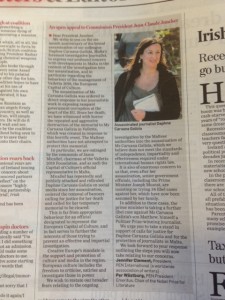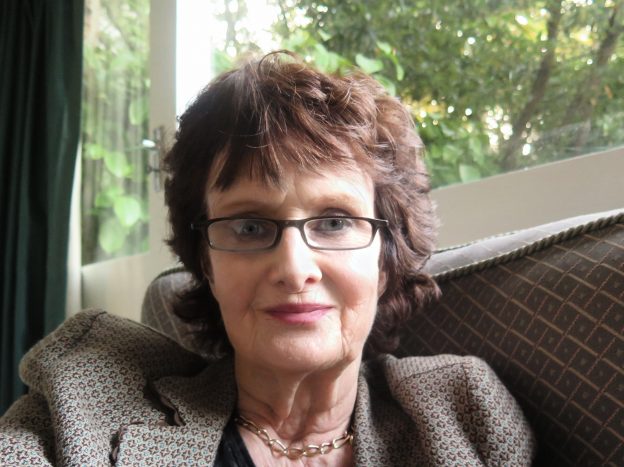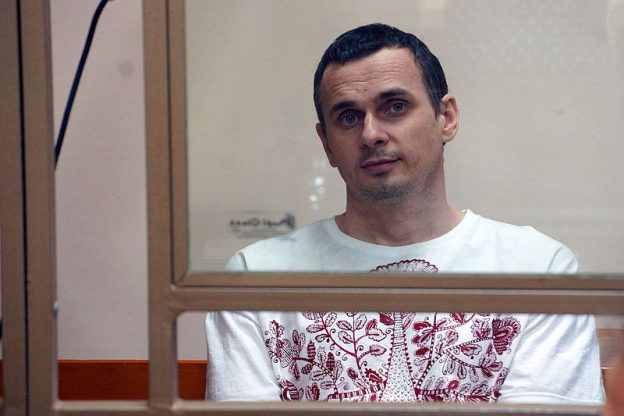 The following letter was published simultaneously in newspapers across the world on Monday 16th April 2018, six months after the murder of Maltese journalist Daphne Caruana Galizia. This action was co-ordinated by International PEN, an organisation that celebrates literature and defends freedom of expression globally.
The following letter was published simultaneously in newspapers across the world on Monday 16th April 2018, six months after the murder of Maltese journalist Daphne Caruana Galizia. This action was co-ordinated by International PEN, an organisation that celebrates literature and defends freedom of expression globally.
As part of the Freedom to Write Campaign, Irish PEN and WORD were in full support of this initiative and gathered the signatories below. The letter appeared in The Irish Independent on 16th April.
16 April 2018
The Shame of Valletta 2018, European Capital of Culture
Dear President Juncker,
Dear Commissioner Timmermans,
Dear Mr Magnier, Director of Creative Europe,
CC/ Commissioner Vella,
We write to you on the six-month anniversary of the brutal assassination of our colleague, Daphne Caruana Galizia, Malta’s foremost investigative journalist, to express our profound concern with developments in Malta in the context of the investigation into her assassination, and in particular regarding the behaviour of the management of Valletta 2018, the European Capital of Culture.
The assassination of Daphne Caruana Galizia was ordered in direct response to her journalistic work in exposing rampant government corruption at the heart of the EU. Since her death, we have witnessed with horror the repeated and aggressive destruction of the memorial to Daphne Caruana Galizia in Valletta, which was created in response to this horrific event. The Maltese authorities have not attempted to protect this memorial. In particular, we are outraged by the comments of Jason Micallef, Chairman of the Valletta 2018 Foundation, and as such the Capital of Culture’s official representative in Malta. Since her assassination, Micallef has repeatedly and publicly attacked and ridiculed Daphne Caruana Galizia on social media, ordered the removal of banners calling for justice for her death and called for her temporary memorial to be cleared. This is far from appropriate behaviour for an official designated to represent the European Capital of Culture, and in fact serves to further the interests of those trying to prevent an effective and impartial investigation into Caruana Galizia’s death.
Creative Europe’s mandate is the support and promotion of culture and media in the region. European culture includes the freedom to criticise, satirise and investigate those in power. The role of the Chairman of the European Capital of Culture should be to safeguard this right, not to threaten it. We believe this behaviour completely demeans the role and has profound implications for the integrity of the programme as a whole. There can be no tolerance for the ridiculing of the assassination of a journalist in the heart of the EU, especially from the very authorities entrusted to promote the EU’s media and culture. We therefore urge you to immediately investigate these allegations against Jason Micallef. If found to be true, we urge you to call for his resignation and for the appointment of a qualified individual who demonstrates the requisite integrity for this role.
Further to these specific concerns relating to Valletta 2018, we wish to restate our broader fears relating to the ongoing investigation by the Maltese Authorities into the assassination of Daphne Caruana Galizia, which we believe does not meet the standards of independence, impartiality and effectiveness required under international human rights law. The very same individuals Caruana Galizia was investigating remain in charge of securing justice in her case, despite a judicial challenge in Malta’s constitutional court from her family, who has now been completely shut out of the assassination investigation. We therefore welcome the initiative of the Parliamentary Assembly of Council of Europe, which is taking the extraordinary step of sending a special rapporteur to scrutinise the investigation.
It is also of enormous concern to us that, even after her assassination, senior government officials, including the Prime Minister, Joseph Muscat, are insisting on trying thirty-four libel cases against her, which have now been assumed by her family. In addition to these cases, the Prime Minister is taking a further libel case against Caruana Galizia’s son, Matthew, himself a Pulitzer-Prize-winning journalist. We have reason to believe that these proceedings are in direct reprisal for his mother’s work in investigating corruption within the current Maltese government. The Prime Minister is currently compelling Matthew to return to Malta to stand trial, despite independent security experts advising Matthew to remain outside Malta due to substantial threats to his life there.
Whistle-blower Maria Efimova, who was one of Daphne Caruana Galizia’s sources on corruption within the disgraced Malta-based Pilatus Bank is facing extradition to Malta from Greece after a European arrest warrant was issued. We believe the charges against Efimova to be purely political and are deeply concerned about both her safety and the independence of the legal process she would face should she be deported to Malta.
We urge you to take a stand in support of calls for justice for Daphne Caruana Galizia and for the protection of journalists in Malta.
We look forward to your response outlining the steps you will now take relating to our concerns.
Sincerely,
Jennifer Clement, President, PEN International
Per Wästburg, PEN President Emeritus, Chair of the Nobel Prize for Literature
(and representatives of PEN centres in more than 30 countries, see below)
IRISH SIGNATORIES:
Fr Tony Gaughan, Irish PEN President,
Vanessa Fox O’Loughlin, Irish PEN Chair,
Frank Geary, Irish PEN, Freedom to Write Campaign
June Considine, Irish PEN, WORD & Freedom to Write Campaign, Ireland
Lia Mills, Irish PEN, WORD & Freedom to Write Campaign, Ireland
Valerie Bistany, Director, Irish Writers Centre
Liz McManus, Chair, Irish Writers Centre Board
Mary O’Donnell, Irish PEN
Marita Conlon McKenna, Irish PEN
Jennifer Barrett, Ireland
Dermot Bolger, Ireland
Evelyn Conlon, Ireland
Mary Costello, Ireland
Darren Darker, Irish PEN
Celia De Fréine, WORD, Ireland
Anne Devlin, PEN International UK/Ireland
Martina Devlin, WORD, Ireland
Katie Donovan, WORD, Ireland
Theo Dorgan, Ireland
Catherine Dunne, WORD, Ireland
Kate Ennals, Word, Ireland
Anne Enright, Republic of Ireland
Mia Gallagher, WORD, Ireland
Carlo Gebler, Northern Ireland
Caroline Graham, WORD, Ireland
Padraig Hanratty, Irish PEN Membership Secretary
Sean Hardie, Ireland
Jack Harte, Ireland
Claire Kilroy, Ireland
Colum McCann, Ireland
Paula McGrath, Ireland
Frank McGuinness, Ireland
Henrietta McKervey, Ireland
Maria MacManus, Ireland
Declan Meade, Ireland
Paula Meehan, Ireland
Paul Muldoon, PEN America
E.R.Murray, Ireland
Éilís Ní Dhuibhne, Irish PEN, WORD and Freedom to Write Campaign, Ireland
Kerrie O’Brien, Ireland
Joseph O’Connor, Ireland
Louise Phillips, WORD, Ireland
DBC Pierre, UK/Ireland
Martin Roper, Republic of Ireland
Tom Sigafoos, WORD, Ireland
Grainne Tobin, Ireland
William Wall, Ireland
INTERNATIONAL SIGNATORIES:
Jennifer Clement, President, PEN International
Per Wästburg, PEN President Emeritus, Chair of the Nobel Prize for Literature
Homero Aridjis, PEN President Emeritus, Former Ambassador of Mexico to UNESCO
Georges Emmanuel Clancier, PEN International Vice-Président Emeritus
Eugene Schoulgin, PEN International Vice-President, PEN Norway
Regula Venske, Regula Venske, President PEN Germany, Member of the Board PEN
International
Burhan Sönmez, PEN Turkey, Member of the Board PEN International
Salil Tripathi, Chair, Writers in Prison Committee, PEN International
Eric Lax, PEN International
Emmanuel Pierrat, Président, French PEN
Elisabeth Åsbrink, President, Swedish PEN
Erik Vlaminck, President, PEN Belgium / Dutch speaking
Fr Tony Gaughan, Irish PEN President
Maureen Freely, Chair of Trustees, English PEN
Per Øhrgaard, President, Danish PEN
Venla Hiidensalo, President, Finnish PEN
Vonne van der Meer, President, PEN Netherlands
Mathias Ospelt, President, PEN Liechtenstein
Antonio Della Rocca, Presidente del PEN Trieste, Member of the Board of PEN International
Elena Chizhova, Director, Saint-Petersburg PEN
Dina Meza, President, PEN Honduras
Jorge Ragal, Presidente PEN Chile
Ciro Añez, President PEN Santa Cruz-Bolivia
Judyth Hill, President, San Miguel PEN Center
José A. Albertini y Luis de la Paz, Presidente, El PEN-Club de Escritores Cubanos en el Exilio
Hanan Awwad, President, Palestine PEN
Folu Agoi, President, PEN Nigeria
Dr Frankie Asare-Donkoh, President, Ghanaian PEN, Secretary-General, PEN Africa Network
Lisa Appignanesi, former President, English PEN
Anders Jerichow, former president, Danish PEN
Sylvestre Clancier, Président d’honneur du PEN français, ancien membre du Comité Exécutif du PEN International
Émile Martel, former President, Centre Québécois du P.E.N. International
Dr. Sascha Feuchert, Vice-President and Writers-in-Prison/Writers-at-Risk-Commissioner, PEN Germany
Andréas Becker, Président du Comité des Écrivains Persécutés, PEN-Club Français
Patrick Tudoret, writer and scholar, vice president French Pen
Isabelle Rossaert, Vice-President, PEN Belgium/Flanders
Markéta Hejkalová, Vice President of Czech PEN
Fiona Graham, Vice-President, Scottish PEN
Connie Bork, Vice-President, Danish PEN
Biyú Suárez C., Vice President PEN Santa Cruz- Bolivia
Prof. Dr. Carlos Collado Seidel, Secretary General, German PEN
Daniel Batliner, Secretary-General P.E.N. Liechtenstein
Burkhard P. Bierschenck, Secretary of PEN Centre of German speaking writers Abroad
Mille Rode, General Secretary, Danish PEN
Khadija Ismayilova, UNESCO/Guillermo Cano World Press Freedom Prize (2016), (Azerbaijan) Honorary Member, Norwegian PEN
Ahmet Şık, UNESCO/Guillermo Cano World Press Freedom Prize (2014) (Turkey)
Ian McEwan, UK
Yann Martel, Canada
Nayantara Sahgal, India
Elif Shafak, English PEN (Turkey)
Caroline Criado Perez (Brazil/UK)
Can Dündar, Former Editor-in-chief, Cumhuriyet (Turkey)
Yann Martel, Canada
Nayantara Sahgal, India
Chloe Aridjis, UK/Mexico
Horácio Costa, Brazil
Lucina Kathmann, PEN International Vice-President Emerita
Christine McKenzie, PEN Melbourne, Australia
Herbert Wiesner, German PEN
Ursula Krechel, German PEN
Tereza Semotamová, Czech PEN
Elsa Cross
Helen Caldwell, New Zealand
Tanja Kinkel, German PEN
Nadezda Azhgikhina, Free Word Association Board Member, Russia
Nik Williams, Project Manager, Scottish PEN
David Manderson, Trustee, Scottish PEN
Laura Waddell, Trustee, Scottish PEN
Mario Relich, Secretary, Scottish PEN
Jenni Calder, Membership Secretary, Scottish PEN
Bashabi Fraser, Trustee, Scottish PEN
Lady Joyce Caplan, Trustee, Scottish PEN
Summer Lopez, Senior Director of Free Expression Programs, PEN America
Félix Villeneuve, Writers in Prison Coordinator, Quebec PEN
Lesley Marshall, New Zealand PEN coordinator
Jens Lohmann, Danish PEN
Marianne Østergaard, Danish PEN,
Uffe Gardel, Danish PEN
Nguyên Hoàng Bao Viêt , Délégué, Comité des Ecrivains et Ecrivaines en prison, Centre PEN Suisse Romand
Gustavo Bracamonte PEN-Guatemala
Emi Kasamatsu PEN Paraguay
Armida Zepeda, PEN San Miguel de Allende-México
Sigrid Bousset, PEN Belgium/ Dutch speaking
Jan Fabre, Antwerp
Stefan Hertmans, Brussels
Lieve Joris, Amsterdam
Koen Peeters, Belgium
Tom Lanoye, Belgium
Marc Reugebrink, Belgium
Bart Moeyaert, Belgium
Alicja Gescinska, Belgium
Nick Mulgrew, Head of Communications, PEN South Africa
Margie Orford, President Emerita of PEN South Africa, PEN International Board Member
Nicky Falkof, PEN South Africa
Romy Sommer, PEN South Africa
Yewande Omotoso, Executive Vice President, PEN South Africa
Jen Thorpe, PEN South Africa
Jacques Rousseau, PEN South Africa
Ingrid de Kok, PEN South Africa
Marcus Low, PEN South Africa
Justin Fox, PEN South Africa
Mike Nicol, PEN, South Africa
Bruce Cooper, PEN, South Africa
Alexander Matthews, PEN South Africa
Kristien Hemmerechts, Belgium
Nina George, German PEN
Arthur Goldstuck, PEN South Africa
Manu Herbstein, PEN South Africa
Carme Arenas, President of PEN Català
Raffaella Salierno, Secretary General of PEN Català
Gemma Rodríguez, Treasurer of PEN Català
Erwin Mortier, Belgium








